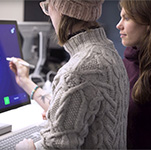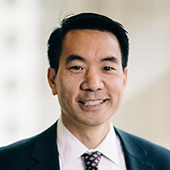News & Events
News Stories
Read the latest news from the Institute for AI in Medicine. The links below take you to articles where you can learn more about our institute's latest events and accomplishments.
 02.24.2026
02.24.2026Ramin Nateghi, PhD, works at the intersection of AI and digital pathology to help ensure correct diagnosis, identification and treatment of prostate cancer.
 12.10.2025"Have a passion for using data to do good and make friends so that you can go further faster — and have more fun.”
12.10.2025"Have a passion for using data to do good and make friends so that you can go further faster — and have more fun.” 12.04.2025Nearly 1 out of every 100 babies has congenital heart disease (CHD). Many parents need help learning about the condition and navigating day-to-day life.
12.04.2025Nearly 1 out of every 100 babies has congenital heart disease (CHD). Many parents need help learning about the condition and navigating day-to-day life. 11.20.2025"Informatics and AI in healthcare reward curiosity and collaboration more than any single technical skill."
11.20.2025"Informatics and AI in healthcare reward curiosity and collaboration more than any single technical skill." 10.30.2025Data-driven implementation trials can transform the way healthcare systems learn, adapt, and improve.
10.30.2025Data-driven implementation trials can transform the way healthcare systems learn, adapt, and improve. 10.28.2025Here’s how everyday people—and clinicians—can use chatbots to answer medical questions.
10.28.2025Here’s how everyday people—and clinicians—can use chatbots to answer medical questions. 09.29.2025Northwestern Medicine experts are shaping how AI is responsibly deployed in health care.
09.29.2025Northwestern Medicine experts are shaping how AI is responsibly deployed in health care. 09.20.2025This "Informatics Insights" series is part of the NUCATS and I.AIM Health Informatics and Data Science Collaborative.
09.20.2025This "Informatics Insights" series is part of the NUCATS and I.AIM Health Informatics and Data Science Collaborative. 09.19.2025
09.19.2025The Center for Bioethics and Medical Humanities jointly with I.AIM announce recipients of the 2025-26 Ethics and Artificial Intelligence Research Grants.
 08.15.2025
08.15.2025April Bell, PhD, was awarded a two-year postdoctoral Hartwell Fellowship for her proposal aiming to improve outcomes for pediatric glioma patients.
 08.07.2025
08.07.2025Joshua Stadlan, PhD, hopes to shape complexity science research and computational social science modeling tools that support social well-being and ethical decision-making in policymaking and civic innovation.
 08.05.2025A hands-on workshop series at The Garage helps fast-track ideas from concept to prototype
08.05.2025A hands-on workshop series at The Garage helps fast-track ideas from concept to prototype 08.01.2025To truly deliver, apps must be transparent, inclusive and protect privacy.
08.01.2025To truly deliver, apps must be transparent, inclusive and protect privacy. 07.29.2025
07.29.2025Network Canvas studies social network influence in public health and how to map it
 06.11.2025
06.11.2025Northwestern Network for Collaborative Intelligence to empower University-wide use of data science and AI
 06.09.2025Scientists at Northwestern University have developed the largest open-access resource of its kind to help researchers shave off months of early-stage drug development time
06.09.2025Scientists at Northwestern University have developed the largest open-access resource of its kind to help researchers shave off months of early-stage drug development time 05.31.2025Healthy Hearts in Manufacturing aims to improve heart care by implementing proven interventions for high blood pressure and tobacco cessation.
05.31.2025Healthy Hearts in Manufacturing aims to improve heart care by implementing proven interventions for high blood pressure and tobacco cessation. 05.27.2025
05.27.2025The American Institute for Medical and Biological Engineering (AIMBE) has announced the induction of Feng Yue, Ph.D., to its College of Fellows.
 05.21.2025
05.21.2025I.AIM faculty and students won awards and presented at the 2025 International The American Thoracic Society Conference.
 04.23.2025
04.23.2025I.AIM and NUCATS welcomed Dr. Martin Chapman, a lecturer in health informatics at Kings College London, for a presentation on Phenoflow and FAIR data principles.
 04.08.2025
04.08.2025Jordan Henry, COMPASS intern, advises fellow students to chase all of their curiosities. She plans to become a public health researcher and professor.